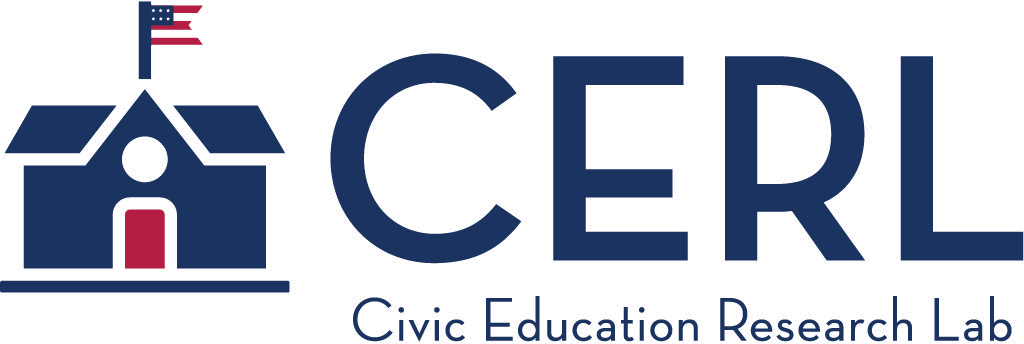
Meghan Volcy, Coordinator of National Grant Projects
The Center for Civic Education hopes to leverage its data, research, and partnerships to bring information straight from the classroom into your hands. This new Research Impact feature will serve as an avenue where the Center will engage our readers and network of civics advocates and champions through highlighting, exploring, and facilitating discussions around emerging qualitative and quantitative research that shows the impact of our programs and civic education more broadly.
The Center, in collaboration with Georgetown University's Civic Education Research Lab (CERL), hosted the Project Citizen Research Program (PCRP) Research Conference at Georgetown University from March 13th to March 14th, 2024. This conference served as the culminating research presentation, bringing together stakeholders across the civics education space - from elementary through graduate school and beyond. Students, teachers, administrators, state agencies, and community-based organizations came together to share best practices, learnings, reflections, and glimpses of the real-world impacts of not only the Project Citizen (PC) curriculum but the power of civic education and empowerment as well.
The impacts of Project Citizen and civic education were the focal point of the event, featuring the release of emerging civic data from Dr. Diana Owen and the CERL team’s new report, “Project Citizen Research Program 2024 Report”. This report evaluated the Center’s PC teacher professional development (PD) program and curriculum impact in the middle and high school grades over the course of three academic years (2020-2023). For teachers, the PD program included a summer institute and academic-year PD sessions, and for students, the PC curriculum had them work as a class to conduct research, develop policy solutions, and present their findings regarding a policy problem in their school or community.
The impact of the two arms of this program is clear. Students and teachers participating in Project Citizen experienced boosts in understanding and confidence in demonstrating or instructing civic knowledge, dispositions, skills, engagement, and the intersection of civics with science, technology, engineering, and math (STEM).
Research on student participants in the Project Citizen program shared:
- Middle school students’ civic knowledge increased by:
- 44% in Year 1
- 76% in Year 2
- 66% in Year 3
- High school students reported becoming more interested in pursuing a career in government service and possibly running for office one day.

- Students felt that they could help organize people to solve a problem in their community.
- The percentage of high school students who were very likely to turn out in elections increased from:
- 69% to 72% in Year 1
- 63% to 69% in Year 2
- 66% to 76% in Year 3
- Middle and high school students achieved significant gains in their problem-solving abilities and civic-expression skills.
- Project Citizen students better understood how they can use STEM skills to address problems in their community.
Project Citizen teachers saw an increase in their own connection to civics in their classrooms and lives. Data on teachers participating in the PD program and teaching the PC curriculum reported:
- Project Citizen teachers placed significantly more emphasis on civic dispositions in their classes after participating in the professional development program.

- The number of teachers who focused a great deal on civic skills increased from:
- 40% to 73% in Year 1
- 57% to 71% in Year 2
- 22% to 47% in Year 3
- Teachers’ integration of activities that convey civic skills into their lessons increased by:
- 156% in Year 1
- 136% in Year 2
- 99% in Year 3
- The percentage of teachers who felt they were greatly effective in encouraging students to become involved in their community increased from:
- 51% to 70% in Year 1
- 55% to 71% in Year 2
- 47% to 54% in Year 3
- The percentage of Project Citizen teachers indicating that their students had used STEM skills in their classes doubled from 25% pre-program to 50% post-program.
The United States is at a political moment where civic education and engagement is more critical than ever. Trust in government and media is eroding, the lines between misinformation and facts are routinely blurred, and communities and schools are emerging from a pandemic that has put undeniable strain on educators and traumatized students. However, there is promising research, as seen in the stories and assessments of participants, that Project Citizen (as well as civic education as a whole) has the power to reconnect students to their education and communities, keep teachers engaged, supported, and thriving in the classroom, and produce informed, empowered, and engaged participants and steerers of democracy—at any age.
For more on the PCRP Conference, visit the event’s landing page, where you can find the livestream recording of the event, slide decks from the various featured presentations, the list of bios for the featured speakers, and more.
The report can be accessed on Georgetown’s CERL website or through ResearchGate. The Executive Summary, which has more data not featured in this spotlight, can be found here.







